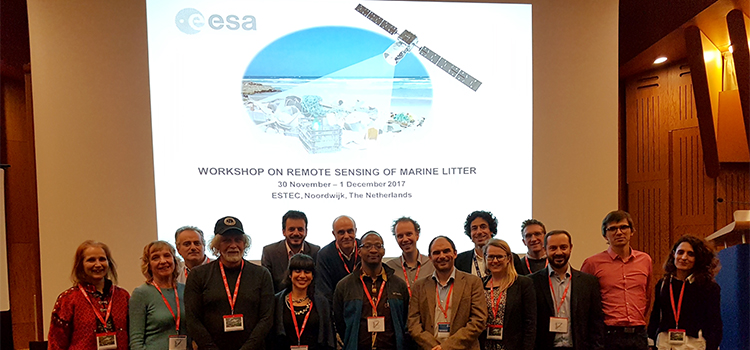Researchers from UCA participate in the ESA project to quantify plastics in the ocean with satellites 19 December 2017
The RESMALI project is funded by the European Space Agency and has 4 partners: University of Cádiz, ARGANS, AIRBUS and OCEAN CLEAN-UP
Researchers from the University of Cádiz participate in a project of the European Space Agency (ESA) to quantify plastics in the ocean using sensors from satellites. The Remote Sensing of Marine Litter project (RESMALI) is funded by ESA and has four international partners: University of Cádiz, ARGANS, AIRBUS and OCEAN CLEAN-UP.
The facilities of the European Space Agency in Noordwijk (Holland) have recently hosted the quarterly implementation meeting of RESMALI with the presence of representatives of the four institutions involved: of ARGANS, a consulting firm based in Plymouth (UK) and project coordinator, the former student of the Faculty of Marine Sciences and Environmental of the UCA, Manuel Arias attended, of AIRBUS in Toulouse (France); Guillaume Bonnery, Laurent Lebreton, from Ocean Clean-up, who participated by videoconference; as well as from the University of Cádiz, the professor of the area of Ecology, Fidel Echevarría, who together with Professor Andrés Cózar are part of the UCA team in this project. The host was Paolo Corradi, of ESA, who acts as technical officer of this international project.
The objective of this meeting was to analyze the progress of the project and present the first deliverable (Application analysis report). In this report, the team’s findings about the characterization of marine litter in terms of composition, nature and spatial and temporal distribution are synthesized. This study is based on a bibliographic review, as well as data collected by the partners themselves (UCA and Ocean CLEAN-UP) and external collaborators. The next step is to find useful parameters to define the requirements of a future mission that could find solutions based on remote sensors to monitor and study marine litter and especially plastics in the ocean.
A continuación, se celebró el workshop On remote sensing of marine litter, de dos días de duración, en el que se analizó la problemática relativa a las acumulaciones de plástico en el océano y a su posible detección con imágenes de satélite. Aproximadamente 25 investigadores representando a 13 instituciones atendieron este workshop, algunos presencialmente y otros por videoconferencia. El profesor de la UCA, Fidel Echevarría, pronunció la conferencia inaugural sobre los principales resultados del proyecto RESMALI.
Then, the On remote sensing of marine litter workshop was held, which lasted two days, in which the problems related to plastic accumulations in the ocean and its possible detection with satellite images were analyzed. Approximately 25 researchers representing 13 institutions attended this workshop, some in person and others by videoconference. The professor of UCA, Fidel Echevarría, gave the inaugural lecture on the main results of the RESMALI project.
The meeting ended with a guided tour of the facilities of ESTEC (European Space Research and Technology Center), one of the most important ESA centres.


